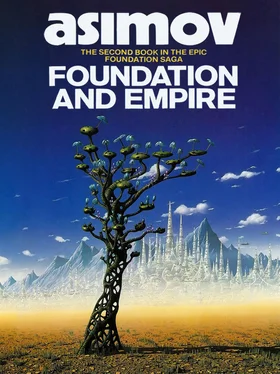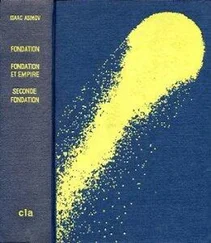“Even better than that, Indbur?”
“Judge for yourself. Two days ago, the so-called Association of Independent Traders declared war on the Mule, and the Foundation fleet is strengthened, at a stroke, by a thousand ships. You see, this Mule goes too far. He finds us divided and quarreling among ourselves and under the pressure of his attack we unite and grow strong. He must lose. It is inevitable—as always.”
Mis still exuded skepticism, “Then you tell me that Seldon planned even for the fortuitous occurrence of a mutant.”
“A mutant! I can’t tell him from a human, nor could you but for the ravings of a rebel captain, some outland youngsters, and an addled juggler and clown. You forget the most conclusive evidence of all—your own.”
“My own?” For just a moment, Mis was startled.
“Your own,” sneered the mayor. “The Time Vault opens in nine weeks. What of that? It opens for a crisis. If this attack of the Mule is not the crisis, where is the ‘real’ one, the one the Vault is opening for? Answer me, you lardish ball.”
The psychologist shrugged, “All right. If it keeps you happy. Do me a favor, though. Just in case . . . just in case old Seldon makes his speech and it does go sour, suppose you let me attend the Grand Opening.”
“All right. Get out of here. And stay out of my sight for nine weeks.”
“With unprintable pleasure, you wizened horror,” muttered Mis to himself as he left.
18
FALL OF THE FOUNDATION
There was an atmosphere about the Time Vault that just missed definition in several directions at once. It was not one of decay, for it was well lit and well conditioned, with the color scheme of the walls lively, and the rows of fixed chairs comfortable and apparently designed for eternal use. It was not even ancient, for three centuries had left no obvious mark. There was certainly no effort at the creation of awe or reverence, for the appointments were simple and everyday—next door to bareness, in fact.
Yet after all the negatives were added and the sum disposed of, something was left—and that something centered about the glass cubicle that dominated half the room with its clear emptiness. Four times in three centuries, the living simulacrum of Hari Seldon himself had sat there and spoken. Twice he had spoken to no audience.
Through three centuries and nine generations, the old man who had seen the great days of universal empire projected himself—and still he understood more of the Galaxy of his great-ultra-great-grandchildren than did those grandchildren themselves.
Patiently that empty cubicle waited.
The first to arrive was Mayor Indbur III, driving his ceremonial ground car through the hushed and anxious streets. Arriving with him was his own chair, higher than those that belonged there, and wider. It was placed before all the others, and Indbur dominated all but the empty glassiness before him.
The solemn official at his left bowed a reverent head. “Excellence, arrangements are completed for the widest possible sub-etheric spread for the official announcement by your excellence tonight.”
“Good. Meanwhile, special interplanetary programs concerning the Time Vault are to continue. There will, of course, be no predictions or speculations of any sort on the subject. Does popular reaction continue satisfactory?”
“Excellence, very much so. The vicious rumors prevailing of late have decreased further. Confidence is widespread.”
“Good!” He gestured the man away and adjusted his elaborate neckpiece to a nicety.
It was twenty minutes of noon!
A select group of the great props of the mayoralty—the leaders of the great Trading organizations—appeared in ones and twos with the degree of pomp appropriate to their financial status and place in mayoral favor. Each presented himself to the mayor, received a gracious word or two, took an assigned seat.
Somewhere, incongruous among the stilted ceremony of all this, Randu of Haven made his appearance and wormed his way unannounced to the mayor’s seat.
“Excellence!” he muttered, and bowed.
Indbur frowned. “You have not been granted an audience.”
“Excellence, I have requested one for a week.”
“I regret that the matters of State involved in the appearance of Seldon have—”
“Excellence, I regret them, too, but I must ask you to rescind your order that the ships of the Independent Traders be distributed among the fleets of the Foundation.”
Indbur had flushed red at the interruption. “This is not the time for discussion.”
“Excellence, it is the only time,” Randu whispered urgently. “As representative of the Independent Trading Worlds, I tell you such a move cannot be obeyed. It must be rescinded before Seldon solves our problem for us. Once the emergency is passed, it will be too late to conciliate and our alliance will melt away.”
Indbur stared at Randu coldly. “You realize that I am head of the Foundation armed forces? Have I the right to determine military policy or have I not?”
“Excellence, you have, but some things are inexpedient.”
“I recognize no inexpediency. It is dangerous to allow your people separate fleets in this emergency. Divided action plays into the hands of the enemy. We must unite, ambassador, militarily as well as politically.”
Randu felt his throat muscles tighten. He omitted the courtesy of the opening title. “You feel safe now that Seldon will speak, and you move against us. A month ago you were soft and yielding, when our ships defeated the Mule at Terel. I might remind you, sir, that it is the Foundation Fleet that has been defeated in open battle five times, and that the ships of the Independent Trading Worlds have won your victories for you.”
Indbur frowned dangerously, “You are no longer welcome upon Terminus, ambassador. Your return will be requested this evening. Furthermore, your connection with subversive democratic forces on Terminus will be—and has been—investigated.”
Randu replied, “When I leave, our ships will go with me. I know nothing of your democrats. I know only that your Foundation’s ships have surrendered to the Mule by the treason of their high officers, not their sailors, democratic or otherwise. I tell you that twenty ships of the Foundation surrendered at Horleggor at the orders of their rear admiral, when they were unharmed and unbeaten. The rear admiral was your own close associate—he presided at the trial of my nephew when he first arrived from Kalgan. It is not the only case we know of and our ships and men will not be risked under potential traitors.”
Indbur said, “You will be placed under guard upon leaving here.”
Randu walked away under the silent stares of the contemptuous coterie of the rulers of Terminus.
It was ten minutes of twelve!
Bayta and Toran had already arrived. They rose in their back seats and beckoned to Randu as he passed.
Randu smiled gently, “You are here after all. How did you work it?”
“Magnifico was our politician,” grinned Toran. “Indbur insists upon his Visi-Sonor composition based on the Time Vault, with himself, no doubt, as hero. Magnifico refused to attend without us, and there was no arguing him out of it. Ebling Mis is with us, or was. He’s wandering about somewhere.” Then, with a sudden access of anxious gravity, “Why, what’s wrong, uncle? You don’t look well.”
Randu nodded, “I suppose not. We’re in for bad times, Toran. When the Mule is disposed of, our turn will come, I’m afraid.”
A straight solemn figure in white approached, and greeted them with a stiff bow.
Bayta’s dark eyes smiled, as she held out her hand, “Captain Pritcher! Are you on space duty then?”
Читать дальше












